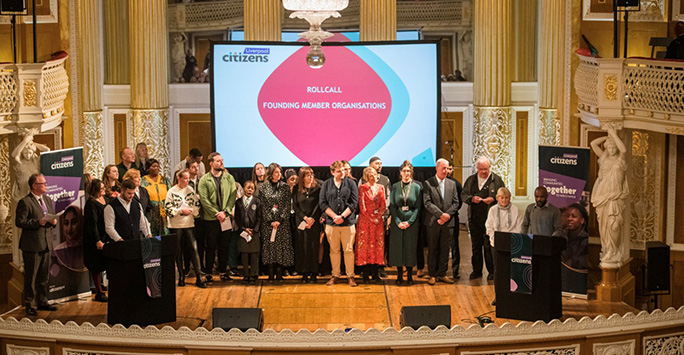Community organising - building skills for collaboration
Posted on: 7 October 2025 by Belinda Tyrrell in Blog

In this latest blog on community organising, Heseltine Institute Research Associate Belinda Tyrrell shares her experience of training with Citizens UK, and reflects on how community organising can help build useful skills to support collaboration, particularly with local communities.
As a researcher interested in bringing a relational and human approach to public services, I have long wondered what universities might learn from community organising -the practice of people working together to create change on the issues that matter most to their lives. These can be big, structural concerns like the real Living Wage or more everyday issues, such as ensuring a reliable bus service so you can get to work or school on time.
Over the past few months, as part of my COLIF Fellowship, I have become involved with Liverpool Citizens, the newest chapter of Citizens UK and have been struck by the solidarity and power that organising can build within communities.
I recently took part in an intensive six-day training—an intensive programme delivered by the UK’s largest and most diverse “people-powered” alliance. Citizens UK brings together 18 local chapters, now including Liverpool, and unites schools, universities, community groups, faith organisations, the NHS, and unions to win meaningful change. My training cohort reflected that diversity, representing sectors and communities from across the country.
A different vocabulary for change
Community organising has a distinctive vocabulary and approach, unlike other outreach or engagement work I have experienced. It is not a one-off consultation or a single campaign. Instead, it is a continuous process of developing relationships, identifying asks, and building alliances across differences to create change.
Four key building blocks stood out to me during the training:
- Relational one-to-one conversations – These are intentional meetings between two people designed to listen deeply, understand one another’s interests, and find common ground. They are not casual chats or debates; they are purposeful opportunities to explore what drives someone, what they value, and where your goals might align. Their power lies in creating trust and connection before any action is taken.
- Actions – In community organising, an “action” is a deliberate, public step designed to show that a community is organised and committed to change. Actions can range from a small gathering to ask a local leader to support a campaign, to a large assembly where hundreds demonstrate their shared priorities. The goal isn’t protest for protest’s sake but to move decision-makers toward practical commitments.
- Negotiation – This is about working with power, not against it. Rather than seeing decision-makers as adversaries, negotiation treats them as potential partners. It means presenting clear, evidence-based “asks,” being respectful yet firm, and seeking solutions that benefit both the community and the institution or leader you’re engaging.
- Power analysis – Organising requires understanding where power lies, who influences decisions, and how change happens. Power analysis helps you identify the people and institutions you need to engage, whether that’s a local councillor, a housing association, or a national policymaker. It ensures your actions and negotiations are strategic and effective.
Lessons beyond community campaigns
The training didn’t just teach techniques—it prompted reflection on my own relationship with power and on how these tools can enrich my research practice. Several lessons have stayed with me:
- The power of listening – Taking time to truly understand what someone is trying to achieve, why they care about an issue, and how it affects their family or community is invaluable. Relational one-to-ones don’t just happen; they require time, curiosity, and active listening. Neither person will have all the answers, but by listening well, you can find them together.
- Planning for change – Change doesn’t happen by accident. You need to know your goal, identify who will support you, and understand the landscape you’re working in. For example, if you’re campaigning for better mental health provision, you must know the local or national policies in play and which decision-makers to approach. This kind of strategic planning mirrors project management skills used in research proposals or professional network building.
- Continuous learning – Success is rarely immediate. Community organising encourages reflection on what worked, what didn’t, and how to adapt. That mindset—iterating and improving—can strengthen academic practice as much as it does grassroots campaigns.
- Building relationships in uncertain times – In today’s world of political uncertainty and widespread disinformation, relationships of trust and shared power can help provide stability and cohesion. During our training visit to the Lozells area of Birmingham, we heard directly from chapter members about the powerful impact that can result when diverse communities unite around common goals. For example, their alliance successfully campaigned for improved mental health services for 16–17 year olds and supported the resettlement of refugees into the local community.
Why this matters for higher education
Community organising offers higher education professionals a methodology for collaboration that is relational, strategic, and impactful. It reminds us that meaningful partnerships require more than a memorandum of understanding—they demand listening, trust, and shared action.
Universities can play an important role by bringing their expertise and networks to community campaigns, amplifying local voices, and nurturing future leaders. By practising these skills—one-to-ones, action planning, negotiation, and power analysis—we can connect our research and teaching to the real-world issues that shape our communities.
Community organising doesn’t just improve outcomes for local residents; it strengthens the democratic fabric of our society. For researchers, staff, and students alike, it offers a way to work alongside communities rather than for them, and to co-create the changes we wish to see.
Keywords: communities, higher education.